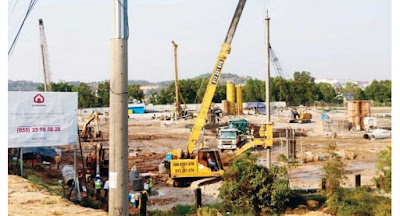According to the Bangkok Post, Thailand’s National Security Council chief has told them that the country has set July 1 for the end of all ‘business and activity lockdowns’
Thailand will reopen to tourists on July 1 but Brits could be banned due to our poor coronavirus record.
People will be expected to wear face masks follow social distancing and wash their hands regularly once restrictions are lifted.
According to the Bangkok Post, Thailand’s National Security Council chief has told them that the country has set July 1 for the end of all ‘business and activity lockdowns’.
Gen Somsak Roongsita told the paper that the State of Emergency brought in on March 26 to deal with the coronavirus pandemic will end in June with a ban on international travel ending at the same time.
The Bangkok Post reports that Gen Roongsita has said that the lifting of restrictions would be a ‘complete reopening of the country’.
But there could be bad news for Brits.
Governor for the Tourism Authority of Thailand, Yuthasak Supasorn, has said that the country would look at restrictions on who could visit.
He told CNN that Thailand would look at tourists’ country of origin “to see if their situation has truly improved”.
This could mean that once again Brits are blacklisted due to the UK’s poor coronavirus record.
Greece and Cyprus have already banned the UK from visiting when they reopen their borders to foreign tourists.
Mr Supasorn said: “We are not going to open all at once.
“We are still on high alert, we just can’t let our guards down yet.
“We have to look at the country of origin [of the travelers] to see if their situation has truly improved. And lastly, we have to see whether our own business operators are ready to receive tourists under the ‘new normal’.”
Next month Thailand will enter the third phase of easing lockdown restrictions with officials preparing measures for July.
“Authorities will have serious discussions because after the emergency decree ends, other laws will be used instead,” Gen Roongsita said.
He added: “People’s cooperation is important. This concerns the use of face masks, social distancing, hand wash and limited activities.
“As long as the disease is spreading worldwide, we will have to fight against it for a while.”
Mr Supasorn told CNN there will be still be restrictions on where people can go.
He added: “We have studied a possibility of offering special long-stay packages in isolated and closed areas where health monitoring can be easily controlled – for example, Koh Pha Ngan and Koh Samui.
“This will be beneficial for both tourists and local residents, since this is almost a kind of quarantine.”
In preparation for the reopening of the country Thailand will next week shorten curfew hours and ease restrictions on more businesses.
This is in response to its low numbers of locally transmitted cases of the coronavirus.
Starting from June 1, cinemas and theatres can reopen, but with no more than 200 people at a time and with strict social distancing measures.
A curfew will be shortened by one hour to last from 11pm to 3am and shopping malls, which reopened earlier this month, will also be allowed to extend their operating hours, he added.
“The reopening will help stimulate the economy and ease some financial burdens,” Somsak said.
Zoos, beauty clinics, spas, and traditional Thai massages will be allowed to operate, with social distancing in place, as will soccer fields and volleyball and basketball courts, but only for training purposes and with limits on spectators.
Fitness clubs can also reopen but with limited users at each time.
Thailand’s planning agency on Thursday said the impacts of the coronavirus could cause the loss of up to 2 million jobs this year, particularly in the tourist industry. It predicts the economy will shrink 5%-6% this year.
Thailand confirmed 11 new coronavirus cases on Friday, an no new deaths. All those cases were arrivals from Kuwait and were in state quarantine.
All but one of the cases reported this week were detected in quarantine.
The coronavirus has infected 3,076 in Thailand since January and killed 57.
Thailand will reopen to tourists on July 1 but Brits could be banned due to our poor coronavirus record.
People will be expected to wear face masks follow social distancing and wash their hands regularly once restrictions are lifted.
According to the Bangkok Post, Thailand’s National Security Council chief has told them that the country has set July 1 for the end of all ‘business and activity lockdowns’.
Gen Somsak Roongsita told the paper that the State of Emergency brought in on March 26 to deal with the coronavirus pandemic will end in June with a ban on international travel ending at the same time.
The Bangkok Post reports that Gen Roongsita has said that the lifting of restrictions would be a ‘complete reopening of the country’.
But there could be bad news for Brits.
Governor for the Tourism Authority of Thailand, Yuthasak Supasorn, has said that the country would look at restrictions on who could visit.
He told CNN that Thailand would look at tourists’ country of origin “to see if their situation has truly improved”.
This could mean that once again Brits are blacklisted due to the UK’s poor coronavirus record.
Greece and Cyprus have already banned the UK from visiting when they reopen their borders to foreign tourists.
Mr Supasorn said: “We are not going to open all at once.
“We are still on high alert, we just can’t let our guards down yet.
“We have to look at the country of origin [of the travelers] to see if their situation has truly improved. And lastly, we have to see whether our own business operators are ready to receive tourists under the ‘new normal’.”
Next month Thailand will enter the third phase of easing lockdown restrictions with officials preparing measures for July.
“Authorities will have serious discussions because after the emergency decree ends, other laws will be used instead,” Gen Roongsita said.
He added: “People’s cooperation is important. This concerns the use of face masks, social distancing, hand wash and limited activities.
“As long as the disease is spreading worldwide, we will have to fight against it for a while.”
Mr Supasorn told CNN there will be still be restrictions on where people can go.
He added: “We have studied a possibility of offering special long-stay packages in isolated and closed areas where health monitoring can be easily controlled – for example, Koh Pha Ngan and Koh Samui.
“This will be beneficial for both tourists and local residents, since this is almost a kind of quarantine.”
In preparation for the reopening of the country Thailand will next week shorten curfew hours and ease restrictions on more businesses.
This is in response to its low numbers of locally transmitted cases of the coronavirus.
Starting from June 1, cinemas and theatres can reopen, but with no more than 200 people at a time and with strict social distancing measures.
A curfew will be shortened by one hour to last from 11pm to 3am and shopping malls, which reopened earlier this month, will also be allowed to extend their operating hours, he added.
“The reopening will help stimulate the economy and ease some financial burdens,” Somsak said.
Zoos, beauty clinics, spas, and traditional Thai massages will be allowed to operate, with social distancing in place, as will soccer fields and volleyball and basketball courts, but only for training purposes and with limits on spectators.
Fitness clubs can also reopen but with limited users at each time.
Thailand’s planning agency on Thursday said the impacts of the coronavirus could cause the loss of up to 2 million jobs this year, particularly in the tourist industry. It predicts the economy will shrink 5%-6% this year.
Thailand confirmed 11 new coronavirus cases on Friday, an no new deaths. All those cases were arrivals from Kuwait and were in state quarantine.
All but one of the cases reported this week were detected in quarantine.
The coronavirus has infected 3,076 in Thailand since January and killed 57.
Source - Pattaya One / Bangkok Post





















